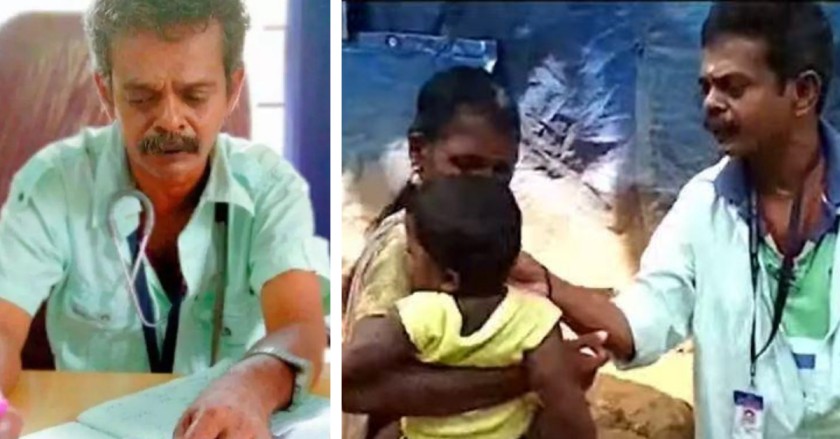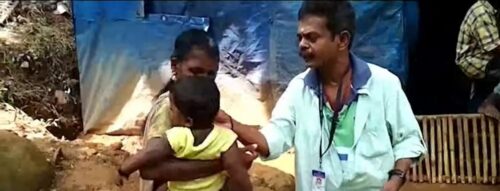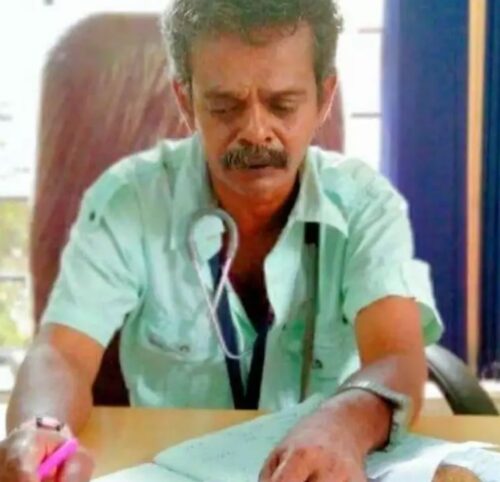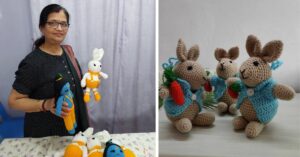For 19 Years, Lone Doctor Braves Wild Animals & Dense Forests to Treat The Needy
“At 2 am we received a phone call about a young girl in labour. It was really dark at night and there was absolutely no way to reach there in time. But Vincent was determined to save the girl and the baby.”

For the past 19 years, Dr Vincent Xavier, 55, has been travelling into the dense forests of Southern India to look after the sick and ailing in tribal communities.
The conscientious doctor walks on foot to reach inaccessible areas, carrying basic medical equipment himself.
Treading into territories where several other doctors have refused to serve in fear of wild animals, Dr Vincent has been a support system for the tribal community in Seethathod, Kerala saving many lives with his timely service over two decades. He charges regular rates for his work. But for the underprivileged, he provides his services for free.
Dr Vincent or as he is lovingly called the ‘Makka Doctor’, talks to The Better India (TBI) about his journey.
How the ‘Makka Doctor’ Won Many Hearts

After graduating from the Tirunelveli Medical College in 1995, Dr Vincent moved back to his home in Nagercoil and served at the Mission Hospital there for six years.
“Those were the first few years of my career and it was also during those years that I got married and started a family. My wife was from Thiruvananthapuram, Kerala and it was during one of my visits to her place that I heard about the Seethathodu village in Pathanamthitta, Kerala. She explained how the tribals in the area were not getting proper medical assistance with it being a remote area. Several doctors who were appointed to the primary health centre in the village refused to go because of the wild elephants and tigers. When I heard this, I immediately decided to take up the job,” Dr Vincent explains.
Though he charges regular rates for the services rendered, he does not take money from underprivileged families.
So in 2001, Dr Vincent started visiting these tribal communities twice a week. With limited roads and no access to public transport to these dense forests, he began travelling on foot.
“Although the villagers in Seethathod warned me that the forest areas were risky because of the wild animals, I decided to go ahead. From thermometers to a pressure gauge, I carry most of the basic equipment that was required,” Vincent explains.
“The first year was difficult because I had to establish a relationship with the tribals and earn their trust. For them, I was an outsider and they needed time to understand my purpose. But in just two years, they began treating me as their own and started calling me the ‘Makka’ doctor’,” Vincent explains.
“Makka means “children” in their tribal dialect so Makka doctor roughly translates to Children’s doctor. That was the kind of relationship I shared with them. They saw me as a fatherly figure and would even call me to their homes during my weekly visits,” he adds.
Braving Dense Forests, Animals to Save Lives

Dr Vincent’s wife, Mini, who has been his huge support throughout his journey has seen several instances in Vincent’s life where he has gone out of his way to help these tribals.
“I still remember back in 2010, there was an 18-year-old tribal girl who was pregnant and was due in a couple of weeks. Vincent was not expecting the baby for another week so he had planned his visits accordingly. But at 2 a.m. we received a phone call from the villagers who told us that the young girl went into labour and was bleeding severely. It was really dark at night and there was absolutely no way to reach there in time but Vincent was determined to save this girl’s life,” Mini explains.
“He grabbed all the medical equipment that he needed and left. The villagers had already called an ambulance from the nearest hospital in Vandiperiyar to Seethathod. But even before the ambulance reached, Vincent was able to reach and give her the primary care she needed. Both the mother and the baby were saved that day,” she adds.
“The child is 10 years old now and the family calls me home every year for his birthday. And it’s instances like these that have given me a sense of purpose,” Vincent says.
Mannan, 24, one of the tribals from the village was also saved by Dr Vincent’s timely treatment.
“When I was just 16, I was bitten by a viper on my way home. Although this wasn’t a rare incident in our area, I did not have anyone nearby to help me out and the situation had worsened by the time the villagers had arrived. But thankfully, Dr Vincent was on his visit that day and instantly put me on fluids at the primary health centre,” Mannan explains.
“Besides being a doctor, he has been a help for us in several ways. In fact on every visit, he brings his own ration kits and other food items for struggling families,” Mannan adds.
By 2009, Vincent’s wife moved back to Nagercoil from Trivandrum while Vincent decided to stay back and rent a house in Seethathod.
“Although there were several opportunities back home, I couldn’t let the community down. So ever since 2009, I’ve been staying in Seethathodu twice every week. But with the pandemic in place, I have been staying here for more than three months now,” Vincent explains.
“Although I was supposed to retire this year, the government has extended the retirement age to 60. And even if I do retire, I will always be the ‘Makka doctor’ for these tribals and that makes me content,” he concludes.
(Edited by Saiqua Sultan)

Similar Story

Starting at 60, Woman Turned Her Passion for Crochet into Toy Business; Earns Rs 14 Lakh
Kanchan Bhadani started her entrepreneurial journey in her 60s by launching a crochet toy business called LoopHoop to pursue her passion for crocheting. Her business empowers tribal women of Jhumri Telaiya in Jharkhand.
Read more >
If you found our stories insightful, informative, or even just enjoyable, we invite you to consider making a voluntary payment to support the work we do at The Better India. Your contribution helps us continue producing quality content that educates, inspires, and drives positive change.
Choose one of the payment options below for your contribution-
By paying for the stories you value, you directly contribute to sustaining our efforts focused on making a difference in the world. Together, let's ensure that impactful stories continue to be told and shared, enriching lives and communities alike.
Thank you for your support. Here are some frequently asked questions you might find helpful to know why you are contributing?


This story made me
-
97
-
121
-
89
-
167












